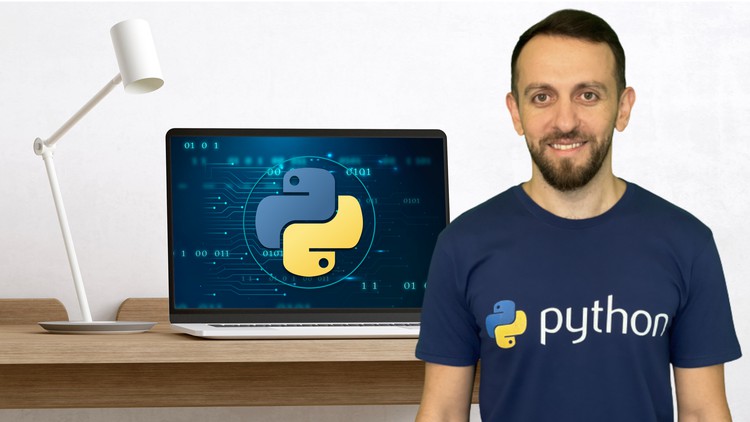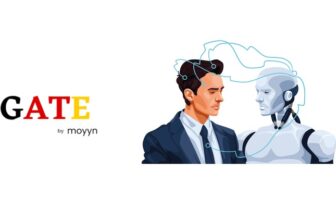Complete Python Bootcamp For Everyone From Zero to Hero 2023 | Udemy Coupons January 2025

Welcome to Complete Python Bootcamp for Everyone, the best and the most comprehensive Python course on the internet.
At 86+ hours, this Python course is without a doubt the most comprehensive and detailed Python course available anywhere online. If you are someone who has zero programming experience, this course will take you from beginner to professional.
Learning Python is one of the fastest ways to improve your career prospects as it is one of the most in demand tech skills! This course will help you in better understanding every detail of Python programming and how these concepts are implemented in high level programming language.
- We’ll take you step-by-step through engaging video tutorials and teach you everything you need to succeed as a professional programmer.
- The course has been updated to be 2023 ready and you’ll be learning the latest tools and technologies used at large companies such as Apple, Google, Microsoft, Amazon and more.
- This course explains everything in details with beautiful animated explanation videos and tens of real life projects which you will get to build. e.g. Ping Pong Game, Snake game, Blackjack , Form Filler and more.
- The curriculum was developed based on my 10+ years programming experience over a period of 2 years.
- We’ve taught over 100,000 students how to code and many have gone on to change their lives by becoming professional developers at top tech companies or starting their own tech startup.
- You do not need to waste your money on expensive bootcamps out there, the course teaches the same curriculum with lifetime access.
- The course is constantly updated with new content, with new projects and modules determined by students – it is a lifetime course.
- We’ll take you step-by-step through engaging video tutorials and teach you everything you need to know to succeed as a Python developer.
- The course includes over 86+ hours of HD video tutorials and builds your programming knowledge while making real-world Python projects.
- The course will guide you master Python Programming language from beginner to advanced
Throughout this comprehensive course, we cover a massive amount of tools and technologies, including:
Section 1 – Why We Program?
- Getting Started with Python
- Why Should You Learn to Write Programs?
- Computer Hardware Architecture
- Installing Python on Mac
- Installing Python on Windows
- Learning a New Language
- The First Conversation with Python
- What is a Bug? What are the Types of Bug?
- What is Debugging?
- Interpreter and Compiler
- Bug, Debugging and Error Types
- Code Editors and IDEs
- Getting Started with Code Editors
- Introduction Quiz
- Print Statement
- Solution to Print Statement Coding Exercise
Section 2 – Variables, Expressions and Statements
- Values and Types
- Variables
- Values and Types Quiz
- Variables Quiz
- Coding Exercise Switch Values
- Switch Values
- Operations and Expressions
- Input Function – Asking the User for Input
- Coding Exercise Input Function
- Type Errors and Type Conversion
- Comments in Python
- Variable Naming
- Variable Naming Quiz
- Coding Exercise – Data Types – Weeks in Years
- f Strings and Rounding Numbers
- Mathematical Operations Quiz
Section 3 – Real Python Projects ( Variable, Expressions and Statements)
- Project 1 Greeting
- Project 2 Band Name Generator
- Project 3 Gross Pay
- Project 4 Celsius to Fahrenheit
- Project 5 Trip Cost Calculator
Section 4 – Conditional Execution
- Boolean Expressions
- Conditional Execution (IF)
- Coding Exercise – Even or Odd
- Nested Conditionals
- Chained Conditionals (IF/ELIF/ELSE)
- Body Mass Index (BMI) Calculator
- Multiple IF Statements
- Coding Exercise – Burger Order
- Logical Operators
- Try and Except
- Conditional Execution
Section 5 – Real Python Projects ( Conditional Execution)
- Project 6 – Gross Pay with Overtime
- Project 7 – Leap Year
- Project 8 – Love Calculator
- Project 9 – Gross Program using Try and Except
- Project 10 – Score Checker
Section 6 – Python Functions
- Function Calls and Built in Functions – Type and Math Functions
- Built in Functions
- What is a Module? – Python Math Module
- Module Quiz
- Coding Exercise – Area of Circle
- Coding Exercise – Factorial
- Randomisation in Python
- Coding Exercise -Random – Coin Toss
- Creating New Functions – User Defined Functions
- Indentation in Python
- Indentation Quiz
- Functions in Practice
- Function with Inputs – Parameters and Arguments
- Coding Exercise – Area of Square
- Coding Exercise – Volume Converter
- Positional and Keyword Arguments
- Coding Exercise – Painting the Wall
- Functions with Outputs
- Coding Exercise – Concatenate
- Multiple Returns
- Password Controller
- Solution to Password Controller
- Docstrings
- Print or Return?
- Why Functions?
Section 7 – Real Python Projects (Python Functions)
- Project 11 – Leap Year with Function
- Project 12 – Gross Pay with Functions
- Project 13 – Cold, Warm and Hot
- Project 14 – Maximum of Three Numbers
Section 8 – Iteration (Lists)
- Understanding the Lists
- For Loop
- Updating Variables
- Coding Exercise – Highest Score
- Coding Exercise – Find Integer Numbers
- Coding Exercise – Sum of Above Average Scores
- Loop Over Custom Function
- Using range() Function with For Loop
- Coding Exercise – Adding Odd Numbers
- Coding Exercise – Adding Even Numbers in ANY Range
- For Loop in Practice
- While Loop
- While Loop in Practice – Hurdle 2
- Finishing iterations with CONTINUE and BREAK
- Factorial using Loop
- Maximum and Minimum of Input Numbers
Section 9 – Real Python Projects (Iteration)
- Project 15 – Dice Rolling Simulator
- Project 16 – Fizz Buzz Game
- Project 17 – Guessing the Number
- Project 18 – Password Generator
- Project 19 – Rock, Paper and Scissors
Section 10 – Introduction to Data Structures
- What is a Data Structure?
- What is an Algorithm?
- Why are Data Structures and Algorithms important?
- Types of Data Structures
Section 11 – Strings
- What is a String?
- Coding Exercise – Sum of Digits of 2 Digit Number
- String Traversal
- Coding Exercise – Backward Traversal
- Coding Exercise – Sum of Digits
- Coding Exercise – Count Characters in a String
- String Operations
- Coding Exercise – First and Last 2 Characters
- String Methods
- Coding Exercise – Replace Character in a String
- String Methods Quiz
- Parsing Strings
- Escape Sequence
- String Formatting
- Coding Exercise – Format a String
- Coding Exercise – Print Pattern
- Project 20 – String Formatting
Section 12 – More on Python Lists
- More on Lists
- Coding Exercise – Square Of Items
- Index Out Of Range
- List Operations
- Index Quiz
- Coding Exercise – Reverse a List using Slice Operator
- List Methods Practice
- Coding Exercise – Update the First Occurrence
- Coding Exercise -First and Last Characters
- List and Functions
- Coding Exercise – Create a List from Two Lists
- Coding Exercise – Remove and Add
- Coding Exercise – Three Equal Chunks
- Strings and Lists
- Coding Exercise – Format List
- Nested List
- Coding Exercise – Add Item in Nested List
- Coding Exercise – Extend Nested List
- Objects and Values
- Coding Exercise – List Addition with Function
- Coding Exercise – Concatenate Two Lists in One List Item Wise
Section 13 – Real Python Projects (List)
- Project 21 – Bill Roulette
- Project 22 – Find the Gold
- Project 23 – Escaping the Maze (From Previous Section)
- Project 24 – Cryptography with Python Caesar Cipher
- How to Encrypt Data?
- Debugging Encrypt Function
- How to Decrypt Data?
- Debugging Decrypt Function
- Putting Encrypt and Decrypt Together
- Code Optimization
- Project 25 – Practice What We Learned
- Dividing the Program into Steps
- Project 26 – Putting Everything Together (Hangman)
Section 14 – Dictionaries
- What is a Dictionary?
- Creating Dictionary and Accessing Dictionary Elements
- Insert/Update an Element in Dictionary
- Coding Exercise – Generate Dictionary
- Traverse / Search for Element in Dictionary
- Coding Exercise – Multiply Dictionary Items
- Coding Exercise – Student Grades
- Remove Elements from Dictionary
- Coding Exercise – Rename Key
- IN / NOT IN Operators with Dictionary
- Coding Exercise – Count Characters in a Word
- Nested Dictionaries
- Handling Missing Keys in Dictionary – get() and setdefault() methods
- Keys in Dictionary – fromkeys() and keys() methods
- Coding Exercise – Group Value Types
- Dictionary items() Method
- Coding Exercise – Length of Dictionary Values
- Dictionary update() Method
- Coding Exercise – Concatenate Three Dictionaries
- Dictionary values() Method
- Coding Exercise – Remove Empty Items
- Reference to Dictionary – copy() Method
- Coding Exercise – Merge Two Dictionary
- Deep Copy
- Coding Exercise – Custom Deep Copy for List Values
- Dictionary Operations and built in Python Functions
- Dictionary vs List
- Dictionary Quiz
Section 15 – Real Projects (Dictionary)
- Project 27 – Calculate Total Price
- Project 28 – Blind Auction Program
- Project 29 – Quiz APP
Section 16 – Tuples
- What is a Tuple?
- Why Tuples?
- Unpacking Tuples
- Coding Exercise Sum Tuple Elements using Unpack
- Traverse Tuple – Enumerate()
- Coding Exercise Even Index with Enumerate
- Searching in Tuple
- Tuple Operations / Functions
- Coding Exercise Find Most Frequent Item
- Nested Tuples
- Nested Tuple Indexing
- Tuple vs List
- Coding Exercise Convert Tuple to Dictionary
- Tuple Quiz
- Project 30 – English to Pig Latin
- Project 31 – Music APP
Section 17 – Sets
- What is Set? Set Terminology
- Sets in Python
- Set Membership
- Adding Members to Set
- Coding Exercise Adding Members from List
- Coding Exercise Remove Duplicates
- Deleting Items from Set
- Delete Restricted Items Using Remove Method
- Union Set
- Coding Exercise Combine Sets
- Coding Exercise Union List of Sets
- Set Intersection
- Set Subtraction
- Set Symmetric Difference
- Modifying Sets
- Subsets and Supersets
Section 18 – Real Projects (Sets)
- Project 32 – Powerball Lottery
Section 19 – Data Structures and Algorithms in Python
- Python Programming Data Structures
- Python Programming Algorithms
Section 20 – Recursion
- What is Recursion?
- Why do we need Recursion?
- The Logic Behind Recursion
- Recursive vs Iterative Solution
- How to write a recursive solution in steps?
- Fibonacci Numbers using Recursion
- Coding Exercise ‘a’ to the power ‘b’ – using Recursion
Section 21 – Project 33 – Flooder Game
- bext Module in Python
Section 22 – Scope in Python
- Global vs Local Scope
- Block Scope in Python
- Modify Global Variable
- Python Constants and Global Scope
- Scope Quiz
- Project 34 – BlackJack – Practice What we have learnt
Section 23 – Debugging – Find and Fix Programming Errors
- Identify the Problem (Error)
- Reproduce the Bug
- Analyse Each Line
- Fix Errors – IDE Messages
- Using print() in Debugging
- Debugger Tools
- Error Types – Syntax Errors
- Runtime Errors
- Logical Errors
- Handling the Errors
- Raise Your Own Exceptions
- Handling Exceptions
Section 24 – Regular expressions
- What is Regular Expression?
- Metacharacters
- Groups and Alteration
- Repetition in Regular Expression Patterns ( ?, *,)
- Greedy and Non Greedy Matches
- Character Classes
- Custom Character Classes
- Caret, Dollar and Dot / Dot-Star
- Anchors
- Grouping Constructs
- Regex Matching with Flags
- re Searching Functions
- re Substitution Functions
- re Utility Functions
- Project 35 – Phone and Email Scraper
Section 25 – Local Development Environment – Installing PyCharm
- Steps for setting up Local Development Environment
- Download PyCharm (Windows/Mac)
- Install PyCharm on Mac
- Install PyCharm on Windows
- Common Features of PyCharm
- Project 36 – Strong Password Detection using Local Development Environment
Section 26 – Files and Directories
- File Systems
- Terminal on Mac and Command Prompt Windows
- Relative and Absolute File Paths
- Quiz Paths
- Navigate the File System with OS Module
- Get File Details with OS Module
- List All Files in Directory Recursively
- Filename Matching with glob Module
- Python’s New Pathlib Module
- Operating System Differences
- Find Last Modified File using Pathlib
- File System Modules (os, glob, pathlib)
- Project 36 – Display a Directory Tree
- Project 37 – Rename all Files in a Directory TODO
- Open and Read Files Text Files
- File Cursor, Read Line and Read Lines
- Searching Through a File
- Reading File Challenge / Exercise
- Parsing Text File
- File Modes
- Writing to Files
- Printing a Text to Files
- Time Table Exercise – (File Writing)
- What is a Binary File?
- Writing and Reading to Binary File
- Shelve Module
- Data Manipulation with Shelve
- Moving and Copying Files
- Deleting Files
- Project 38 – Quiz using Files
Section 27 – Object Oriented Programming – OOP
- What is OOP? Why we need it?
- Object Oriented Thinking
- OOP Concepts Classes, Objects, Attributes and Mehtods
- Constructing Objects – Accessing Attributes and Methods
- BlackJack OOP
- Classes – Create Your Own Class
- Class Attributes
- Class Methods
- Checking Instance Types
- Encapsulation
- Getters and Setters
- Inheritance
- Inheritance with Parameters
- Inheritance Challenge
- Overriding Methods
- Project 39 – Bike Rental System using OOP
- datetime Module in Python
Section 28 – Excel Automation – Openpyxl Library
- Introduction – Advantages and Use Cases of Openpyxl
- Reading Excel Spreadsheets
- Iterating Through Excel
- Columns, Rows and Cells
- Manipulate Excel Data
- Project 40 – Automate Daily Routine Excel Task
- Create Spreadsheet, Sheets and Update Cells
- Manage Rows and Columns
- Generate Random Excel Data – Challenge
- Excel Formulas
- Cell Styles
- Conditional Formatting
- Charts
- Line Charts – Coding Challenge
- Project 41 – Transpose Excel File from Rows to Columns
Section 29 – PDF Automation
- Extract PDF Metadata and Text
- Create, Merge and Copy PDFs
- Split, Rotate and Overlay
- Decrypt and Encrypt
- Project 42 – Combine Specific Pages (add cover page) to PDF
Section 30 – Web Scraping with Beautiful Soup
- What is Web Scraping?
- Basic HTML Skills
- Parsing HTML with Beautiful Soup
- Find and Select Specific Elements
- Steps for Web Scraping a Real Website
- Do All Websites Allow Web Scraping?
- Project 43 – Beautiful Soap – Airpods rating on Amazon
Section 31 – Selenium Library – Python BOTs
- Why Selenium?
- Setup Selenium
- How Select Elements in Website
- Scrap Data using Selenium
- How to Clicking Buttons and Filling Text Fields
- Sending Special Keys and Browser Buttons
- Project 44 – Selenium – Follow on Instagram
Section 32 – GUI Automation
- What is GUI Automation? Installing PYAUTOGUI Module
- Mouse Movement
- Mouse Interaction
- Mouse Drag – Challenge
- Screenshot and Image Recognition
- Controlling the Keyboard and Show Messages
- Project 45 – GUI Automation – Looking Busy
- Project 46 – Form Filler
Section 33 – Working with CSV Data – The Pandas
- Reading CSV
- Data Types and Basic Statistics
- Pandas Data Structures – Series
- Accessing Series Elements
- Pandas Data Structures – DataFrame
- Accessing DataFrame
- Query Dataset
- Group and Aggregate the Data
- Write to CSV
Section 34 – Turtle Module
- Introduction to Turtle Graphics
- Move Turtle
- Draw Shape – Challenge
- Drawing and Filling Present Shapes
- Drawing Polygons
- Draw Dashed Shapes
- RGB Color – Generate Random Color
- Screen and Turtle Properties
- Move Random Directions – Challenge
- How to Create Games with Turtle
- Write Method – Default Values for Function Arguments
- Project 47 – Draw Panda
- Project 48 – Draw National Flag of India
- Project 49 – Draw National Flag of Your COUNTRY
- Project 50 – Schengen Countries
- Project 51 – Turtle Race
- Project 53 – Snake Game using OOP
Section 35 – Tkinter Module
- Introduction to Tkinter
- Creating and Configuring Widgets
- Unlimited Positional and Keyword Arguments (*args and **kwargs)
- Widget Placement – Geometry Managers
- Handling Events
- Label Widget
- Button Widget
- Check and Radio Buttons
- Entry Widget
- Combobox and Spinbox
- Progress Bar and Scale
- Organize Widgets with Frame
- Frame Widget
- Top Level Window Widget
- Paned Window Widget
- Notebook Widget – Tabs
- Project 54 – Feedback Form
- Project 55 – Pomodoro App
- Project 56 – Text Editor
Section 37 – Using SQLite in Python
- What is SQLite?
- Project 55 – SQLite App
- Project 56 – Bookstore
Section 38 – Using MySQL in Python
- What is MySQL?
- Project 57 – MySQL App
Section 39 Using PostgreSQL in Python
- What is PostgreSQL?
- Project 58 – PostgreSQL
Section 40 – Web Services – RESTful APIs with Flask
- Create API using Flask
- Project 59 – APIs
Section 41 – Advanced Python
- Lambda
- List Comprehension
- Generators
- Decorators
- Multithreading in Python
- Data and Meta Classes
Section 42 – Data Analyses and Visualization
- Matplotlib
- Seaborn
Section 43 – Real Projects
- Project 60 – 100
Sign up today, and look forward to:
- Video Lectures
- Lecture Slides
- Code Challenges and Exercises
- Real Life Projects
- Quizzes
- Programming Resources and Notes
- Downloads
Don not just take my word for it, check out what existing students have to say about my courses:
“Great explaining and has a ton of exercises, and he is updating it till this day. He codes a lot in the course, and he is fast at it, so for people looking for a fast paced course, this is a great option!.” – Hyper O.
“The teacher is great! he explains everything in full details especially with real life examples. he uses the right algorithm in making his teaching methods effective so students don’t get bored and sleepy.” – Precious Ogbonna Nwakama
“Nicely explained with graphics for non non programmers. Thank you. Amazingly simple to understand. Best wishes to the instructor.” – Shahnawaz Ayon
“- Amazing Explanation
-The guy explains everything.
-He explains with diagrams. Then with algorithm. Then with code.
-This three times explanation makes the topics very retentive for a learner.
.” – Abinash Dash
“Thats how a course should be! Excellent explanation and lot of coding excercises to practice.
I read some comments on the accent of the trainer being not so good and all, but its very clear in fact!
Am excited for the next sections…
.” – Siddhesh Sule
“Excellent course for those looking to understand data structures and algorithms from beginner to advanced level. The theoretical explanations are well done, along with concrete real life examples. All data structures and algorithms described and then implemented, which makes the concepts easier to understand and gives you a chance to apply them in a real practice. The top tech’s interview questions and answers sections are excellent bonus which allow for preparing real interviews.”
– Johanna David
So what are you waiting for? Click the buy now button and join the world’s best and most comprehensive development course.
Free
If the coupon is not opening, disable Adblock, or try another browser.
If you reach this page after the coupon expired then search the latest coupon here
Tags: udemy coupons 100 off, udemy coupons, udemy coupons 2025, udemy online free courses, Udemy Coupons January 2025
#udemycoupons






